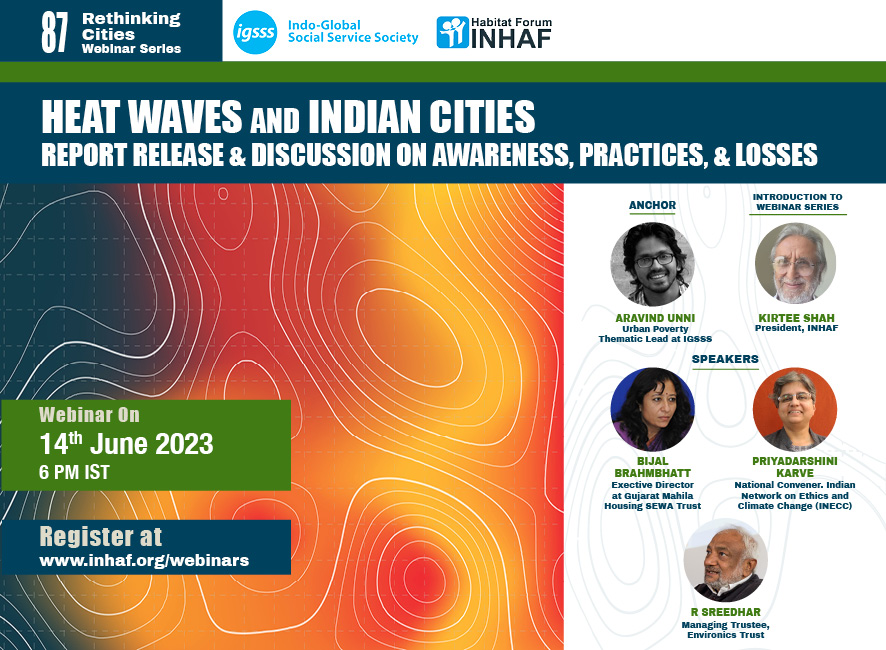
Speakers
-
 Aravind UnniUrban Poverty Thematic Lead, IGSSS
Aravind UnniUrban Poverty Thematic Lead, IGSSSHe is working as Urban Poverty Thematic Lead with Indo-Global Social Service Society, and handling developmental interventions with the most marginalized sections of the urban poor in more than 30 cities spread across 15 states. His core area of interest for research and action on urbanization and its intersection with poverty in cities, and has hands-on experience in working with communities over the last six years in participatory planning, formulating policy recommendations for people’s concerns related to housing and livelihoods, and advocating for equitable and just cities. Aravind Unni has completed his B.Arch from Jamia Millia Islamia, New Delhi and M.S. Arch from University of California- Berkeley, and is currently pursuing his PhD on Urban Social Movements from Tata Institute of Social Sciences in Mumbai.
-
 Bijal BrahmbhattDirector, Mahila Housing SEWA Trust (MHT)
Bijal BrahmbhattDirector, Mahila Housing SEWA Trust (MHT)Bijal Brahmbhatt is currently the Director of Mahila Housing SEWA Trust (MHT). Bijal has extensive experience in, and broad knowledge of intersectional challenges that are mediated through housing and habitat, governance (lack there-of), informality, and gender for low-income urban communities and migrants in cities. She represents and advocates for the rights to improve living conditions, foster climate resilience and overall economic security, through socio-technical approaches and women-led models, never to miss important opportunities, advocate across multiple scales, and break silos.
Her work of over 20 years in cities can be best summed up to be in the areas of formal, informal, and invisible governance for housing and habitat—an amalgam of individual/ household/ community and city-level activities; strategies through which women can seek public goods and services central to their well-being; voice and agency essential for making claims on the state and spaces for participation (social capital), all of which happen outside of the gaze of formalized governance arrangements. Her programmes have helped women participate in city-level initiatives, a small step to make cities inclusive. She constantly engages with markets for pro-poor solutions, and with policymakers to solicit not just marginal improvements but driving system-level changes.
Bijal is a Fellow (2015) of the Womanity Foundation, Switzerland; a finalist of Schwab Foundation’s Social Entrepreneur of the year, India. She was awarded the Surya Mitra National Award for creating sustainable energy assets for equitable access in Urban Areas by the Selco Foundation.
She is a member of the InsuResilience Gender Working Group of the InsuResilience Global Partnership which works towards gender-sensitive Climate and Disaster Risk Finance and Insurance solutions and she has contributed to the InsuResilience Global Partnership Declaration on Gender.
Bijal holds a degree in Civil Engineering and has a certificate in Urban Planning and Management, from the Institute of Housing Studies, Netherlands. -
 Priyadarshini Karve
Priyadarshini Karve -
 R Shreedhar
R Shreedhar
Local Time
- Timezone: America/New_York
- Date: Jun 14 2023
- Time: 8:30 am - 10:30 am
Heat Waves and Indian Cities – Report Release & Discussion on Awareness, Practices, & Losses
Heatwaves are extreme weather events characterized by prolonged periods of excessively high temperatures, often accompanied by high humidity. These events can have profound impacts on both human and natural systems, making them a topic of significant concern. In recent years, the frequency and intensity of heatwaves have been on the rise, prompting us to conduct a survey, to better understand their impacts and raise awareness among the public. The reports aim to delve into the impacts of heatwaves, the importance of studying them, and the results of the survey conducted in 16 cities.
Heatwaves pose a range of threats to human health, ecosystems, and socioeconomic sectors. The most immediate impact is on human health, as excessive heat can lead to heat exhaustion, heatstroke, and even death, particularly among vulnerable populations such as the elderly, children, and individuals. Heatwaves have economic implications, including reduced labour productivity, increased energy demand for cooling, and extra expenses to mitigate its effect. Yet the exact nature of awareness, existing practices and losses experienced by people/ communities is mostly undocumented. This research initiative was therefore launched to attempt an explorative enquiry on people’s awareness, practices & losses due to heatwaves. This is expected to help us pave way for better – improved heat wave policies and practices in our urban centres. Additionally, the survey assessed the public’s awareness of heatwaves and their understanding of the associated risks. While the results varied across cities, overall, the survey highlighted the need for improved public education and outreach programs to enhance awareness about heat waves, their impacts, and the appropriate actions to be taken during such events. These findings emphasize the importance of disseminating information and engaging communities in heatwave preparedness and resilience initiatives.
The insights gained from this study on heatwaves can serve as a valuable foundation for further discussions on how to better prepare for these events and improve policies related to heatwaves. The study’s findings can be utilized to identify specific vulnerabilities and challenges faced by communities during heatwaves, leading to the development of tailored strategies and interventions. Additionally, the study can contribute to enhancing early warning systems and forecasting models, enabling more accurate predictions and timely actions. Policymakers can leverage the study’s results to advocate for policy changes that prioritize heatwave preparedness in cities, promote heat-resilient infrastructure, and address the economic and societal impacts of heatwaves in the urban. By utilizing the study’s insights and through this discussion, communities and the civil society can work together to develop comprehensive approaches, allocate resources effectively, and build resilient urban communities in the face of heatwaves.
